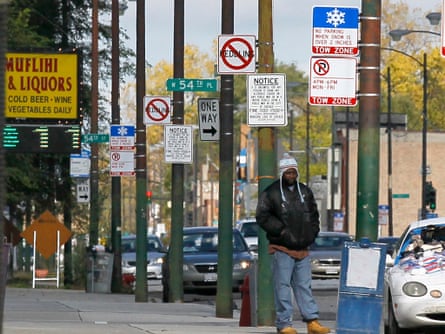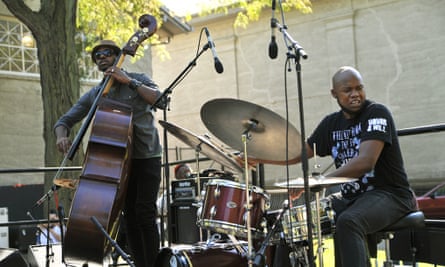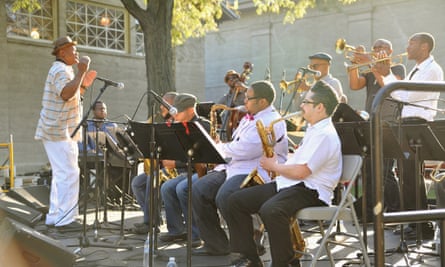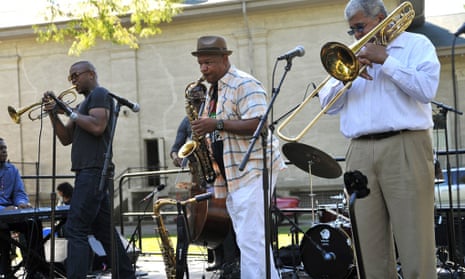One of Chicago’s most violent neighborhoods is now part of a percolating movement to renew the South Side’s cultural viability.
Although overall crime has fallen in the city over decades, shootings remain concentrated in city’s most impoverished communities, which have struggled with systemic unemployment and, more recently, mass school closings – all of which makes the annual jazz festival in the heart of Englewood, one of the city’s most struggling neighborhoods, more improbable.
And yet, this Saturday, on the grounds of the Hamilton Park Cultural Center, The Englewood Jazz Festival will debut its largest, most expansive celebration in its 15 year history. The festival will feature a lineup of the city’s most renowned “free jazz” musicians and composers who more often play in downtown venues than the far recesses of the city’s South Side.
“Just bringing culture back to the neighborhood in general, that’s the reason in a nutshell” for the festival, says organizer Ernest Dawkins.
“You have to go all the way downtown to see jazz and kids don’t really get exposed to the music. Nothing is happening in the daytime hours for them. That’s what I like about the festival. Kids play in the background, but they are also being exposed to music. And they enjoy it.”
Dawkins, a 60-year-old internationally recognized saxophonist and composer, remembers when the South Side was home to lively nightclub strips where music played seven nights a week, at clubs with exotic names like the Persian Ballroom, The Regal and the Cadillac Lounge.

But as manufacturing jobs disappeared, so too did its music corridors. In Englewood today, the unemployment rate (21%) is more than twice that of greater Chicago’s and per-capita income ($11,993) is less than half.
However, things are changing. With the Hyde Park Jazz Festival, 27-28 September, the opening of the Promontory, a new music club operated by owners of several successful North Side clubs, and the activity of the South Side Big Band – a group of veteran jazz and R&B veterans – the Englewood festival is part of a movement to reinvigorate the South Side.
Indeed, while the rest of Chicago often sees Englewood as dangerous or downtrodden, the people who live there say that they also see the good: large parks, easy access to downtown, the $200m construction of Kennedy-King College, plus connections with hometown heroes like Chicago Bulls star Derrick Rose, actress/musician Jennifer Hudson, and Grammy winner Chaka Khan, who all have maintained ties to their former neighborhood.
Ray Joy, executive director for Arts Alliance Illinois, an arts education advocacy group, is also a South Side resident, and says that recent efforts in Englewood confirm that “progress is being made” to enliven a stronger community there based on its assets: a strong core of activists who are determined to combat negative stereotypes with positive ones: urban farms, neighborhood festivals and more.
“If you look at Englewood, there is a new way of thinking and a new way of doing things, so where there is progress, oftentimes it is happening in untraditional ways,” he says.
The Englewood festival is a prime example. It will bring an abbreviated performance of Memory in the Center, an Afro Jazz Opera, a Dawkins composition he wrote as a tribute to Nelson Mandela, to the neighborhood. The full 90-minute version received its world premiere over the recent Labor Day weekend, when it kicked off the Chicago Jazz Festival at the Pritzker Pavilion in Millennium Park.

Although Dawkins has primarily structured the Englewood festival around more traditional jazz, this year it will serve as a tribute to the Association for the Advancement of Creative Musicians (AACM), the innovative free jazz collective of Chicago musicians that dates back to the mid-60s.
On the bill are tenor saxophonist and trumpeter and AACM founder Chico Freeman, and his uncle, the guitarist George Freeman, who once recorded and toured with Lester Young and Charlie Parker. Joining them will be trumpeter Marquis Hill and his group, a quintet fronted by jazz vocalist Denise Thimes, and Dawkins’ own New Horizons Quartet with guest William Parker on bass.
As a 19-year-old, Dawkins received his first lessons from members of the AACM and he later joined the organization, becoming one of its chief advocates. He says the Chicago aesthetic cultivated from those musicians emphasized individuality, both in style and performance.

“We made the conscious decision to stay here when we could have gone to New York. But we said, ‘We’re going to make our careers happen here’ and ‘We’ve been successful,” he says. His efforts also include a yearlong mentoring program in Hamilton Park for young musicians from all over the city. They too will perform in a big band Saturday.
“Everything is how you look at things. I don’t think [Englewood] as being bad. I see it as being an opportunity,” he says. ‘If you want to work and make things happen, you have fertile ground.”
The Englewood Jazz Festival is 11am to 6pm 20 September, at the Hamilton Park Cultural Center, 513 W 72nd St. The festival is outdoors, but in case of rain, it will move into the park auditorium. Visit englewoodjazzfest.org.

Comments (…)
Sign in or create your Guardian account to join the discussion